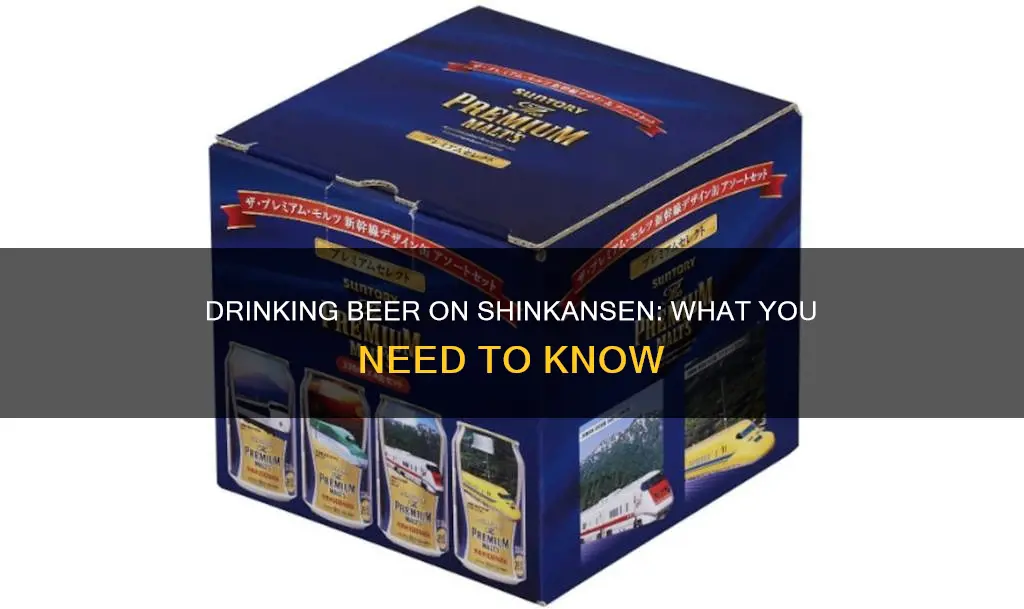
Japan is known for its high-speed Shinkansen bullet trains, which can travel up to 200 miles per hour. While it is not common etiquette to eat and drink on local transit in Japan, it is perfectly acceptable to do so on long-distance trains like the Shinkansen. In fact, it is a national tradition. You can bring your own alcoholic beverages on board, and beer, sake, and whiskey are also sold on the Shinkansen. However, it is important to be considerate of other passengers and not drink too much or be loud, as this may be looked down upon by some in Japanese society.
| Characteristics | Values |
|---|---|
| Drinking alcohol on Shinkansen | Allowed |
| Bringing your own alcoholic beverage onboard | Allowed |
| Alcoholic beverages sold onboard | Beer, sake, and whiskey |
| Eating on Shinkansen | Allowed |
| Food and drinks sold onboard | Yes |
| Food and drinks allowed from outside the train | Yes |
What You'll Learn
- You can drink beer on the Shinkansen, but be mindful of your surroundings and other passengers
- Drinking in public is not prohibited in Japan, but there are certain places where it is not allowed
- It is common to see people drinking beer on the Shinkansen, especially after work or a long day
- You can bring your own beer on the Shinkansen, or purchase one from a vendor on board
- It is important to be respectful and follow Japanese drinking culture when drinking on the Shinkansen

You can drink beer on the Shinkansen, but be mindful of your surroundings and other passengers
Yes, you can drink beer on the Shinkansen. In fact, you can drink any alcoholic beverage on the Shinkansen, and you can bring your own drinks on board. You can also buy beer, sake, and whiskey on the Shinkansen, as well as ekiben (bento boxes designed for train travel).
However, it is important to be mindful of your surroundings and other passengers when drinking on the Shinkansen. Drinking in public, including on trains, is often looked down upon in Japanese society. While it may be legally allowed, it is important to be respectful and considerate of others.
For example, it is considered rude to talk loudly on the Shinkansen, as most passengers are silent or speak in minimal whispers. It is also important to be aware of your belongings and ensure they are not taking up too much space. Additionally, be sure to dispose of any trash, as littering is severely frowned upon.
It is also worth noting that drinking alcohol on trains can be controversial in Japan. While some people may be okay with it on the Shinkansen, they may not approve of it on commuter trains. Others may find it obnoxious or unacceptable on crowded trains, even if they are going to tourist sights. Therefore, it is crucial to be mindful of your surroundings and other passengers when drinking on the Shinkansen.
Antibiotics and Alcohol: A Risky Mix?
You may want to see also

Drinking in public is not prohibited in Japan, but there are certain places where it is not allowed
In Japan, drinking in public is generally accepted, and it is not uncommon to see people enjoying a beverage outdoors or on a train. However, it is important to be mindful of local customs and manners. For example, drinking and being loud on public transportation is considered rude and may be looked down upon by other passengers. It is also important to dispose of any trash properly, as littering is frowned upon.
When it comes to drinking on trains, such as the Shinkansen, opinions vary. Some people may find it obnoxious, especially on crowded trains or during commute hours. It is generally considered acceptable to drink on long-distance trains or in designated areas, but it is important to be considerate of other passengers and not disturb them.
Additionally, it is worth noting that the legal drinking age in Japan is 20 years old, and minor drinking is prohibited. It is also illegal to force others to drink, as it is considered harassment. Drunk driving and causing trouble to the public while intoxicated are also violations of the law.
In summary, while drinking in public is not prohibited in Japan, it is important to be mindful of local regulations, customs, and manners. Drinking should be done respectfully, and it is crucial to prioritize the comfort and safety of those around you.
IBS and Beer: Is It Safe to Drink?
You may want to see also

It is common to see people drinking beer on the Shinkansen, especially after work or a long day
Shinkansen seats are designed with tray tables, allowing passengers to enjoy their meals and drinks comfortably. The train also offers a trolley service, where snacks, bento boxes, sandwiches, and drinks are sold. In addition to purchasing drinks on the train, passengers are also allowed to bring their own beverages on board.
For those looking to sample local alcoholic beverages, train stations typically have small liquor stores selling craft beers, local sake, and small bottles of wine designed for train travel. One popular choice is the German Pilsner-style beer, The Premium Malt's, brewed by the Japanese company Suntory. The beer features limited-edition cans showcasing different Shinkansen models and well-known landscapes along their routes.
While drinking on the Shinkansen is permitted, it is important to be mindful of other passengers and maintain a quiet and respectful atmosphere. This includes disposing of any trash properly, as littering is severely frowned upon in Japan.
Beer and Macros: Can You Drink and Stay on Track?
You may want to see also

You can bring your own beer on the Shinkansen, or purchase one from a vendor on board
If you're planning a trip on the Shinkansen, you may be wondering about the rules around drinking beer on board. Well, wonder no more! Here's everything you need to know about bringing and consuming your own beer on the Shinkansen, as well as purchasing beer from a vendor during your journey.
Firstly, it's important to note that drinking alcohol in public is not prohibited in Japan. This includes drinking on trains, such as the Shinkansen. So, if you're craving a cold one while speeding through the Japanese countryside, rest assured that you are allowed to bring and consume your own beer on board. Just make sure you are of legal drinking age, which is 20 years old in Japan.
When it comes to bringing your own beer, there are a few things to keep in mind. Firstly, be mindful of other passengers and avoid causing any disturbances. Drinking quietly and respectfully is key. Additionally, make sure to dispose of your trash properly, as littering is severely frowned upon.
Now, if you're running low on beer or prefer to travel light, you can always purchase beer on board the Shinkansen. Vendors walk through the train selling snacks, bento boxes, sandwiches, and drinks. You can also find vending machines at train stations that sell beer and other alcoholic beverages. So, if you're looking for a wider selection or a last-minute drink to bring on board, the train station is your best bet.
When it comes to drinking beer on the Shinkansen, it's important to be mindful of train etiquette. Keep the volume low, as loud conversations are not common in Japan. Additionally, avoid crowding the walkway with your belongings and be considerate of other passengers, especially those who may be eating.
So, whether you bring your own beer or purchase one on board, just remember to drink responsibly and follow Japanese cultural norms. By doing so, you'll be able to enjoy your beer and the beautiful scenery as you speed through Japan on the Shinkansen.
Beer Drinking Without Weight Gain: Is It Possible?
You may want to see also

It is important to be respectful and follow Japanese drinking culture when drinking on the Shinkansen
It is important to be mindful of cultural norms and expectations when drinking on the Shinkansen. While drinking on the Shinkansen is allowed, it is crucial to follow Japanese drinking culture and be respectful of other passengers. Here are some key points to consider:
Firstly, drinking in public, including on trains, is legal in Japan. However, it is important to consume alcohol in a respectful and low-key manner. Drinking in public is generally associated with older men, people of lower socioeconomic status, or salary men after work. While some people may drink and enjoy snacks on the Shinkansen, it is not a party train. It is important to be mindful of this cultural context and adapt your behaviour accordingly.
Secondly, in Japanese drinking culture, there is a term called "nomikai," which refers to drinking parties that are common in workplaces, schools, and social clubs. These gatherings are important for building social connections and are often compulsory, especially in traditional Japanese firms. While nomikai are not always directly related to career advancement, employees who choose not to participate may miss out on bonding opportunities and could be perceived as not being a team player. However, it is generally unacceptable to pressure others into drinking or consuming more than they wish.
Thirdly, when drinking on the Shinkansen, it is essential to be mindful of other passengers and maintain a quiet and peaceful atmosphere. Talking loudly is considered rude on Japanese trains, and most passengers prefer minimal whispering conversations. Additionally, it is important to dispose of any trash properly, as littering is severely frowned upon.
Lastly, be mindful of cultural differences and respect the norms and expectations of Japanese drinking culture. While drinking on the Shinkansen is allowed, it is important to do so in a respectful and considerate manner, ensuring that you do not disturb or offend other passengers. Remember, even if no one expresses their discomfort directly, it does not mean that your behaviour is appropriate or welcome.
In summary, when drinking on the Shinkansen, it is crucial to follow Japanese drinking culture and be respectful of other passengers. This includes drinking in a low-key manner, understanding the importance of "nomikai" in Japanese work culture, maintaining a quiet atmosphere, disposing of trash properly, and being mindful of cultural differences. By following these guidelines, you can ensure that you are being respectful and considerate of Japanese norms and expectations.
Drinking Beer While Pregnant: How Much Is Too Much?
You may want to see also
Frequently asked questions
Yes, you can drink beer on the Shinkansen.
Yes, you can buy beer at the station, either from vending machines or small liquor stores.
Yes, you are allowed to bring your own drinks onto the Shinkansen.
Yes, but it is important to be considerate of other passengers. Drinking in public is considered controversial in Japan, so it is best to drink quietly and not in crowded areas.
Yes, it is legal to drink alcohol on trains in Japan, but it is important to be respectful and not drink too much.







